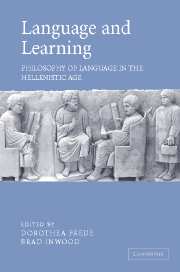Book contents
- Frontmatter
- Contents
- List of contributors
- Preface
- List of abbreviations
- Introduction
- 1 The Stoics on the origin of language and the foundations of etymology
- 2 Stoic linguistics, Plato's Cratylus, and Augustine's De dialectica
- 3 Epicurus and his predecessors on the origin of language
- 4 Lucretius on what language is not
- 5 Communicating Cynicism: Diogenes' gangsta rap
- 6 Common sense: concepts, definition and meaning in and out of the Stoa
- 7 Varro's anti-analogist
- 8 The Stoics on fallacies of equivocation
- 9 What is a disjunction?
- 10 Theories of language in the Hellenistic age and in the twelfth and thirteenth centuries
- References
- Index nominum et rerum
- Index locorum
1 - The Stoics on the origin of language and the foundations of etymology
Published online by Cambridge University Press: 23 November 2009
- Frontmatter
- Contents
- List of contributors
- Preface
- List of abbreviations
- Introduction
- 1 The Stoics on the origin of language and the foundations of etymology
- 2 Stoic linguistics, Plato's Cratylus, and Augustine's De dialectica
- 3 Epicurus and his predecessors on the origin of language
- 4 Lucretius on what language is not
- 5 Communicating Cynicism: Diogenes' gangsta rap
- 6 Common sense: concepts, definition and meaning in and out of the Stoa
- 7 Varro's anti-analogist
- 8 The Stoics on fallacies of equivocation
- 9 What is a disjunction?
- 10 Theories of language in the Hellenistic age and in the twelfth and thirteenth centuries
- References
- Index nominum et rerum
- Index locorum
Summary
The Stoics were notorious for their addiction to etymology. Chrysippus very likely invented the term, which is first attested in book titles of his (D.L. 7.200). And many Stoic etymologies have come down to us. So, for instance, Chrysippus derived λαός (laos, people) from λαλѽ (lalō, speak), and maintained that people are so called because speech is what sets human beings apart from other animals; ἄνθρωπος (anthrōpos, human being) yields a similar message by alluding to the possession of articulate voice (διωρθρωμἑνη ὄψ, diōrthrōmenē ops) (Herodianus, Reliquiae GG 3.1.108, 9–16 Lentz = FDS 671). Fate (ἡ πεπρωμἑνη, peprōmenē, or ἡ εἱμαρμἑνη, heimarmenē) is the perfected (πεπερασμἑνη, peperasmenē) administration of the world and, so to speak, something strung together (εἰρομἑνη, eiromenē) by the will of god (Diogenianus apud Eusebium, PE 6.8.1–10 = SVF 2.914). It would be easy to add more examples, but these should be enough to give the flavour of Stoic etymology. The belief that words encode descriptive content that can be recovered by finding the words from which they are derived is the basis for Stoic etymology as it was for the etymologies proposed by Socrates in the Cratylus. And as these examples show, the information that the Stoics believed that they were able to recover in this way may be important and illuminating. On their view, the opinions reflected in the words that were formed at the beginning of human history, when language was young, were in important points superior to those of their own day, and their motive for practising etymology was the recovery of this primitive wisdom.
Information
- Type
- Chapter
- Information
- Language and LearningPhilosophy of Language in the Hellenistic Age, pp. 14 - 35Publisher: Cambridge University PressPrint publication year: 2005
Accessibility standard: Unknown
Why this information is here
This section outlines the accessibility features of this content - including support for screen readers, full keyboard navigation and high-contrast display options. This may not be relevant for you.Accessibility Information
- 12
- Cited by
